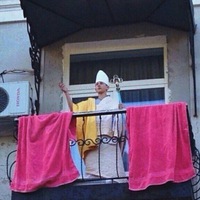
Вопрос задан 08.05.2019 в 08:42.
Предмет Музыка.
Спрашивает Никула Вася.
1...."отец оперы"? 2...."отец современного балета"? 3. ...."отец оперетты"? 4. ..."бог танца"?
5...."ангелогласый"? 6..."кудесник балета"? 7..."богатырь русской музыки"? 8...."одинокий гений"? 9..."голос Америки"? 10..."русское бельканто"? 11..."золотой баритон"? 12..."соловей Казахстана"? 13..."королева сопрано"? 14..."принц труверов"? 15..."дедушка русского романса"? 16..."отец блюза"? 17..."отец белого блюза"? 18...первая леди джаза"? 19..."первая поющая леди экрана"? 20...."царица русской песни"? 21..."чайка русской эстрады"? 22...."хрустальный голос в России"? 23..."поэт фортепиано"? 0
0
 0
0
Ответы на вопрос
 Внимание! Ответы на вопросы дают живые люди. Они могут содержать ошибочную информацию, заблуждения, а также ответы могут быть сгенерированы нейросетями. Будьте внимательны. Если вы уверены, что ответ неверный, нажмите кнопку "Пожаловаться" под ответом.
Внимание! Ответы на вопросы дают живые люди. Они могут содержать ошибочную информацию, заблуждения, а также ответы могут быть сгенерированы нейросетями. Будьте внимательны. Если вы уверены, что ответ неверный, нажмите кнопку "Пожаловаться" под ответом.

Отвечает Панов Никита.
1. Михаил Иванович Глинка
2. Жорж Новерр
3. Оффенбах
4. Терпсихора
5. камерный ансамбль старинной музыки "Иоанн Кукузел" ангелогласый"
6. Цискаридзе
7. Александр Порфирьевич Бородин
8. Бетховен; Лермонтов
9. радиостанция
10. вокальный факультет Международного славянского института в Москве
11. Дмитрий Хворостовский
12. Бибигуль Тулегенова
13. Елена Образцова
14. Тибо Шампанский
15. Николай Алексеевич Титов
16. Уильям Кристофер Хенди
17. Джон Майалл
18. Элла Фицджеральд
19. Джанет Макдональд
20. Лидия Русланова
21. Анастасия Вяльцева
22. Валентина Толкунова
23. Фредерик Шопен
2. Жорж Новерр
3. Оффенбах
4. Терпсихора
5. камерный ансамбль старинной музыки "Иоанн Кукузел" ангелогласый"
6. Цискаридзе
7. Александр Порфирьевич Бородин
8. Бетховен; Лермонтов
9. радиостанция
10. вокальный факультет Международного славянского института в Москве
11. Дмитрий Хворостовский
12. Бибигуль Тулегенова
13. Елена Образцова
14. Тибо Шампанский
15. Николай Алексеевич Титов
16. Уильям Кристофер Хенди
17. Джон Майалл
18. Элла Фицджеральд
19. Джанет Макдональд
20. Лидия Русланова
21. Анастасия Вяльцева
22. Валентина Толкунова
23. Фредерик Шопен
 0
0
 0
0

Отвечает нейросеть ChatGpt. Будьте внимательны, ответы нейросети могут содержать ошибочные или выдуманные данные.
1. "Отец оперы"
The term "отец оперы" translates to "father of opera" in English. It is commonly used to refer to the Italian composer Claudio Monteverdi. Monteverdi is considered one of the pioneers of opera and is credited with developing the genre during the late 16th and early 17th centuries. His works, such as "Orfeo" and "L'incoronazione di Poppea," played a significant role in shaping the operatic form as we know it today. [[1]]2. "Отец современного балета"
The term "отец современного балета" translates to "father of modern ballet" in English. It is commonly used to refer to the Russian ballet dancer and choreographer, Sergei Diaghilev. Diaghilev is best known for his work as the founder and artistic director of the Ballets Russes, a ballet company that revolutionized the art form in the early 20th century. Under Diaghilev's leadership, the Ballets Russes showcased groundbreaking choreography, collaborations with prominent artists, and innovative productions that pushed the boundaries of traditional ballet. His contributions to the development of modern ballet are widely recognized and celebrated. [[2]]3. "Отец оперетты"
The term "отец оперетты" translates to "father of operetta" in English. It is commonly used to refer to the Austrian composer Franz von Suppé. Suppé is known for his numerous operettas, which are light, comedic musical works that combine elements of opera and musical theater. His most famous operetta is "Die Fledermaus" (The Bat), which remains popular and frequently performed to this day. Suppé's operettas played a significant role in popularizing the genre and establishing its conventions. [[3]]4. "Бог танца"
The term "бог танца" translates to "god of dance" in English. It is a title often associated with the Russian ballet dancer and choreographer, Vaslav Nijinsky. Nijinsky is considered one of the greatest male dancers in the history of ballet. He rose to prominence as a principal dancer with the Ballets Russes and was known for his extraordinary athleticism, technical skill, and expressive performances. Nijinsky's innovative choreography and his ability to embody characters with depth and emotion earned him the reputation as a "god of dance." [[4]]5. "Ангелогласый"
The term "ангелогласый" translates to "angel-voiced" in English. It is a term often used to describe singers with exceptionally beautiful and pure voices. The term is typically associated with sopranos or countertenors who possess a clear, ethereal quality in their vocal timbre. It is a compliment to the singer's ability to produce a heavenly and captivating sound. [[5]]6. "Кудесник балета"
The term "кудесник балета" translates to "magician of ballet" in English. It is a metaphorical expression used to describe a ballet dancer who possesses exceptional technical skills, artistry, and the ability to captivate audiences with their performances. The term emphasizes the dancer's ability to create a sense of magic and awe through their movements and interpretation of the choreography. [[6]]7. "Богатырь русской музыки"
The term "богатырь русской музыки" translates to "hero of Russian music" in English. It is a title often associated with the Russian composer, Mikhail Glinka. Glinka is considered the founder of Russian classical music and played a crucial role in establishing a distinct Russian musical identity. His compositions, such as the opera "Ruslan and Lyudmila" and the orchestral work "Kamarinskaya," drew inspiration from Russian folk music and folklore, contributing to the development of a nationalistic style in Russian music. [[7]]8. "Одинокий гений"
The term "одинокий гений" translates to "lonely genius" in English. It is a phrase often used to describe artists or individuals who possess exceptional talent or creativity but may feel isolated or misunderstood due to their unique perspectives or unconventional ideas. The term highlights the idea that geniuses often stand apart from the mainstream and may face challenges in finding like-minded individuals or recognition for their work. [[8]]9. "Голос Америки"
The term "голос Америки" translates to "Voice of America" in English. It refers to a U.S. government-funded multimedia news organization that provides news and information in various languages to audiences around the world. Voice of America (VOA) was established in 1942 and serves as a source of unbiased news, cultural programming, and educational content. Its mission is to promote democracy and freedom of expression by providing accurate and reliable news coverage. [[9]]10. "Русское бельканто"
The term "русское бельканто" translates to "Russian bel canto" in English. It refers to a style of singing that emphasizes beauty of tone, agility, and expressive phrasing. Bel canto is an Italian term that means "beautiful singing," and it originated in the 18th century. Russian bel canto refers to the Russian tradition of operatic singing, which combines the technical aspects of bel canto with the unique characteristics of the Russian vocal school. It is characterized by a rich, resonant tone, expressive interpretation, and a focus on lyrical and melodic lines. [[10]]11. "Золотой баритон"
The term "золотой баритон" translates to "golden baritone" in English. It is a metaphorical expression used to describe a baritone singer with an exceptional voice and artistic qualities. The term highlights the singer's ability to produce a warm, rich, and resonant sound, often associated with a sense of luxury or brilliance. It is a compliment to the singer's vocal abilities and their mastery of the baritone repertoire. [[11]]12. "Соловей Казахстана"
The term "соловей Казахстана" translates to "nightingale of Kazakhstan" in English. It is a title often associated with the Kazakh singer, Roza Rymbayeva. Rymbayeva is known for her powerful and expressive voice, which has earned her recognition as one of the leading vocalists in Kazakhstan. The term "соловей" (nightingale) is used metaphorically to describe a singer with exceptional vocal abilities and the ability to captivate audiences with their performances. [[12]]13. "Королева сопрано"
The term "королева сопрано" translates to "queen of soprano" in English. It is a metaphorical expression used to describe a soprano singer who is considered one of the leading performers in the soprano repertoire. The term highlights the singer's exceptional vocal range, technique, and artistry, positioning them as a prominent figure in the world of opera and classical music. [[13]]14. "Принц труверов"
The term "принц труверов" translates to "prince of troubadours" in English. It is a metaphorical expression used to describe a tenor singer who specializes in performing the repertoire of troubadour songs. Troubadours were medieval poets and musicians who composed and performed lyrical songs in the Occitan language. The term "принц" (prince) emphasizes the singer's mastery of this repertoire and their ability to convey the poetic and emotional qualities of troubadour music. [[14]]15. "Дедушка русского романса"
The term "дедушка русского романса" translates to "grandfather of Russian romance" in English. It is a title often associated with the Russian composer and singer, Alexander Vertinsky. Vertinsky is known for his contributions to the genre of Russian romance, a type of art song that emerged in the late 19th and early 20th centuries. The term "дедушка" (grandfather) is used metaphorically to honor Vertinsky's role in popularizing and shaping the Russian romance tradition. [[15]]16. "Отец блюза"
The term "отец блюза" translates to "father of the blues" in English. It is commonly used to refer to the American musician W.C. Handy. Handy is recognized as one of the pioneers of the blues genre and played a crucial role in popularizing it during the early 20th century. His compositions, such as "St. Louis Blues," helped establish the blues as a distinct musical style and influenced generations of musicians. [[16]]17. "Отец белого блюза"
The term "отец белого блюза" translates to "father of white blues" in English. It is commonly used to refer to the American musician and singer, Elvis Presley. Presley is known for his contributions to rock and roll music, which drew heavily from blues, gospel, and other African American musical traditions. His energetic performances and unique blend of musical styles helped popularize rock and roll among a wider audience, earning him the title "father of white blues." [[17]]18. "Пер
 0
0
 0
0
Топ вопросов за вчера в категории Музыка

Музыка 5
Последние заданные вопросы в категории Музыка
Предметы
-
Математика
-
Литература
-
Алгебра
-
Русский язык
-
Геометрия
-
Английский язык
-
Химия
-
Физика
-
Биология
-
Другие предметы
-
История
-
Обществознание
-
Окружающий мир
-
География
-
Українська мова
-
Информатика
-
Українська література
-
Қазақ тiлi
-
Экономика
-
Музыка
-
Право
-
Беларуская мова
-
Французский язык
-
Немецкий язык
-
МХК
-
ОБЖ
-
Психология
-
Физкультура и спорт
-
Астрономия
-
Кыргыз тили
-
Оʻzbek tili












